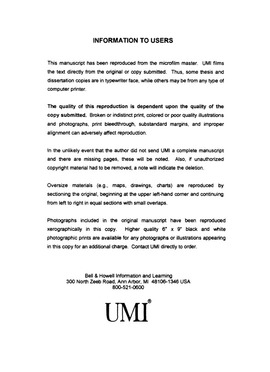| dc.contributor.advisor | Levy, David, | en_US |
| dc.contributor.author | Voss, Dirk Karl. | en_US |
| dc.date.accessioned | 2013-08-16T12:31:10Z | |
| dc.date.available | 2013-08-16T12:31:10Z | |
| dc.date.issued | 2000 | en_US |
| dc.identifier.uri | https://hdl.handle.net/11244/6040 | |
| dc.description.abstract | In the early nineteenth century, Americans believed Germans were sluggish, phlegmatic, kind, and devoted to beer-drinking. By the end of the nineteenth century Americans perceived Germans as efficient, hard-working, militaristic, and still devoted to beer-drinking. This considerable shift in attitudes raises the central questions of why and how Americans developed and changed their image of foreign nations. This dissertation uses the perception of Germans in American travel books, diaries, and letters of the nineteenth century as a concept to show how economic, political, and social developments changed the way Americans pictured Germans. The key to the creation and changing of stereotypes is the economic development of the two nations. In the early nineteenth century, a market revolution transformed large parts of the United States from a mostly agrarian, pre-modern society to a fast-moving, time-oriented, industrialized nation. Compared to the more modern society of America, pre-modern Germany reassured Americans of their superiority and even evoked sympathy for a nonthreatening and harmless German culture. When Germany emerged as an industrial giant and defeated France in 1870, most American travelers explained their observation of German military efficiency and cleanliness in terms of national character or racial traits, but ignored underlying economic causes for the sweeping changes in German society. Behind German military victories and perceived German national character lay the combination of a gigantic industrial machine and a modernizing state. Compulsory schools, military drill, and factory work discipline turned German pre-industrial slackers into efficient workers. The increased wealth that went hand in hand with industrial production allowed Germans to apply higher standards of cleanliness and hygiene. | en_US |
| dc.format.extent | viii, 296 leaves ; | en_US |
| dc.subject | Germany Description and travel. | en_US |
| dc.subject | History, United States. | en_US |
| dc.subject | Germany Foreign public opinion, American History 20th century. | en_US |
| dc.subject | National characteristics, German. | en_US |
| dc.subject | History, European. | en_US |
| dc.subject | Public opinion United States History 20th century. | en_US |
| dc.subject | Public opinion United States History 19th century. | en_US |
| dc.subject | Germany Foreign public opinion, American History 19th century. | en_US |
| dc.subject | Literature, American. | en_US |
| dc.title | National stereotypes about Germans in American travel writings, 1815--1914. | en_US |
| dc.type | Thesis | en_US |
| dc.thesis.degree | Ph.D. | en_US |
| dc.thesis.degreeDiscipline | Department of History | en_US |
| dc.note | Source: Dissertation Abstracts International, Volume: 61-09, Section: A, page: 3740. | en_US |
| dc.note | Major Professor: David Levy. | en_US |
| ou.identifier | (UMI)AAI9988505 | en_US |
| ou.group | College of Arts and Sciences::Department of History | |
